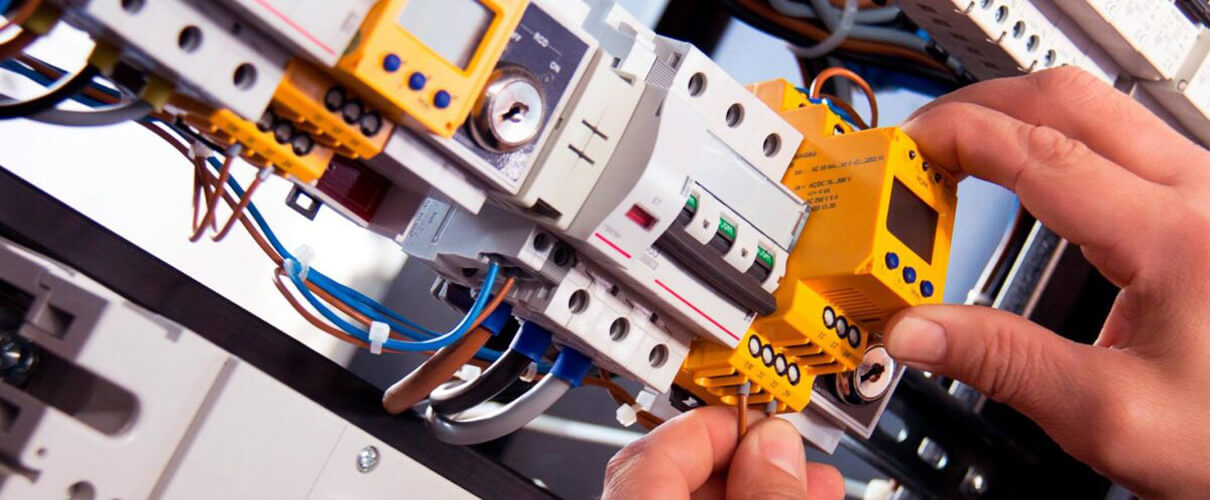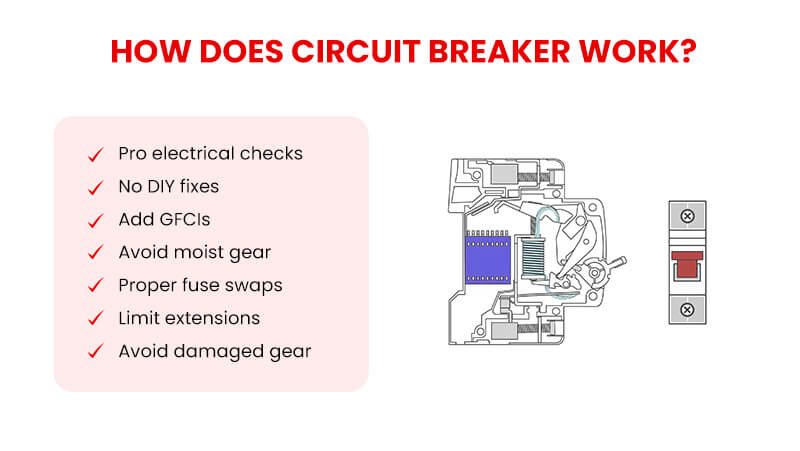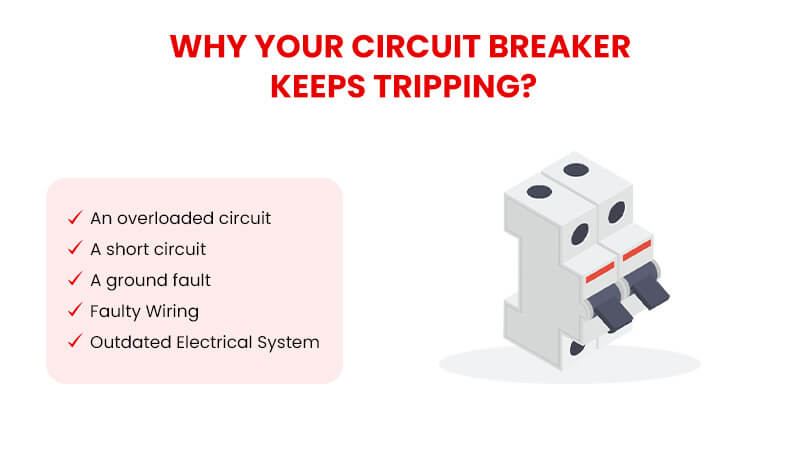What Should You Do If Your Breaker Keeps Tripping?

Are you constantly frustrated by your home’s circuit breaker tripping? Luckily, you’re not the only one. A breaker tripped may also pose a safety risk in addition to being an annoyance. But don’t worry, there are easy fixes for this frequent issue. We’ll go over the causes of why your circuit breaker keeps tripping and how to resolve the problem in this blog article.
To maintain a hassle-free and seamless electrical system in your house, continue reading for our comprehensive guide that includes everything from troubleshooting suggestions to likely reasons and expert support.
What is a Circuit Breaker?
One of the most crucial safety features in your house and a need nowadays is the circuit breaker. These little devices cut the power when a building’s electrical wiring becomes overloaded and wait for the issue to be resolved.
Household electricity would not be feasible without circuit breakers, also known as fuses, due to the risk of fires and other mishaps caused by basic wiring issues and device malfunctions.
How Does Circuit Breaker Work?
It is necessary to first comprehend a few fundamental ideas about electricity in order to comprehend how circuit breakers work. A switch regulates the flow of electricity in a standard electrical circuit, enabling the circuit to be switched on or off.
The circuit is complete and energy may flow freely, powering the linked devices, when the switch is closed. The switch would not be able to manage the excessive quantity of power in the event of an overload or short circuit, which might heat it up and perhaps cause damage or even a fire. Let’s simplify this further:
- Circuit breakers sense overloads and short circuits and instantly cut off the current.
- They work with a bimetallic strip, which is a mechanism consisting of two distinct metals joined by a bond.
- The bimetallic strip warms up when electricity flows over it, causing the metals to expand differently.
- The strip bends as the temperature rises until it reaches a breaking point, which stops the current flow of electricity.
- Another essential part are electromagnets, which are made of wire coils around a metal core.
- When the current flow exceeds a certain threshold, electromagnets are triggered to become magnetized.
- A lever attached to the bimetallic strip is drawn to the magnetic electromagnet, which increases its bending force and snaps it, opening the circuit.

When there is a short circuit, the electromagnet senses the abnormally high current flow right away and triggers the lever mechanism, which breaks the bimetallic strip and disconnects the circuit. The electromagnet may need a few seconds to detect a large current in an overload scenario, giving it time to recognize the issue before cutting the circuit.
It is essential to remember that, in contrast to fuses, which must be changed following each overload or short circuit, circuit breakers are intended to be reused. With just a flick of the switch, the bimetallic strip cools down and resets itself when the circuit is disrupted, enabling the circuit to be reestablished.
Aside from safeguarding against overloads and short circuits, another benefit of circuit breakers is their manual off/on capability. This can be useful while working on a circuit or when there is no power.
Why is My Circuit Breaker Constantly Tripping?
Your initial thought when your breaker trips is probably one of worry or irritation. A tripped breaker is an indication that something is amiss, and it can really disrupt your day depending on when it occurs. It is an essential safety element that keeps you and your house safe from fire, even if it might be inconvenient at times.
6 Main Causes Why Your Circuit Breaker Keeps Tripping
Let’s get into why your power breaker keeps tripping:
The purpose of circuit breakers is to protect your family and yourself. Three things cause them to trip:
- An overloaded circuit.
- A short circuit
- A ground fault
- Faulty Wiring
- Outdated Electrical System
Below is an explanation of each of these issues and how to resolve them.
1. Overloaded circuit
Circuit breakers that trip are most often caused by an overloaded circuit. It happens when a circuit is subjected to higher electrical current than it designed to handle. This typically occurs when an excessive number of electrical equipment are plugged into an outlet or when a large device, such as a microwave, is plugged into a circuit that isn’t designed for it.
Circuit overloads can be hazardous. They may lead to the overheating of the wiring in your house, which may ignite a fire.This is particularly typical for devices that need a lot of electricity, such as:
- Washers and dryers
- Microwaves
- Air conditioners
- Dishwashers
- Refrigerators
- Ovens
How to Fix It?
Certain electric equipment should be moved to a different circuit. Should the location of all the appliances be imperative, an electrician could be required to install a new circuit.
Short Circuit
When electricity is permitted to flow down an unauthorized channel, a short circuit occurs. This typically happens in houses when a hot wire breaks or the hot wire (black) comes into contact with another wire.
The challenge here is that the electrical item you’ve connected to your home’s wiring or the wire itself may have a short. Some possible causes of a short circuit include:
- Loose connections or loose wire
- Corroded wires
- Faulty wiring, fixtures, appliances, plugs or switches
- Wiring damaged by pest activity
How to Fix It
Fixing a short circuit is a dangerous issue that should only be handled by a certified electrician. If you think there could be a short in your house, get in touch with a qualified electrician.

Ground Fault
In actuality, a ground fault is a kind of short circuit. Usually, it happens when the hot wire comes into contact with the side of the metal box (which is grounded as well) or the ground wire, which is often bare copper. Something trapped in an electrical socket that shouldn’t be there might potentially result in a ground fault.
How to Fix It
It goes without saying that you should never stick your fingers or anything else in an electrical socket. This is a highly severe issue, so call a qualified electrician if you think your home’s wiring has a ground fault.
4. Faulty Wiring
Faulty wiring is another possible safety risk that might trigger a tripping breaker. Damage from rodents, incorrect installation, and general wear and tear can all cause wire damage over time. A fire hazard might result from short circuits caused by these broken cables. It is essential to contact expert repair technicians to evaluate and fix any issues with the wiring, such as flickering lights, burning odors, or outlets that feel warm to the touch.
5. Outdated Electrical System
Your home’s electrical system can be antiquated and ill-suited to the needs of contemporary appliances and gadgets if it is older than twenty years. Old outlets, breakers, and wiring can be very dangerous and should be changed by a qualified electrician. In addition to enhancing safety, updating your electrical system may raise the value of your house.
H3: 6. Water Exposure
Because water and electricity don’t mix well, there may be electrical risks including ground faults and short circuits. To avoid mishaps, make sure to keep appliances, wiring, and electrical outlets away from sources of water.
Safety Tips to Prevent Breaker from Tripping
If your circuit breaker continues tripping, which is theoretically a good thing because it’s meant to keep you safe, it indicates that there’s a problem with your system. Although the information on frequent reasons for a tripping breaker above is meant to assist you in troubleshooting and diagnosing the issue, this can also indicate a number of dangerous scenarios.
Newer homes have their electrical systems installed in compliance with strict electrical codes. Your risk is far smaller than that of a homeowner having issues in a more older property, even though there’s a chance your installation was done poorly. As a result, you must exercise extreme caution whenever you work with your electrical panel, appliances, or any exposed wire.
Try these tips to avoid circuit breaker tripping:
- Invest in an electrical safety inspection service and never try to fix your own electrical equipment.
- If your kitchen and bathroom don’t already have GFCIs, add them now.
- Any moist equipment should not be touched.
- Make sure you swap out blown fuses for ones with the same rating.
- Steer clear of regular use of extension cables.
- Give up utilizing connections or gadgets that appear damaged.

Circuit Breaker Repair Near Me
Is the frequent tripping of the circuit breaker causing you discomfort or disturbing your normal functioning? Don’t let your electrical problems take away your convenience or put you at risk. At Appliance Medic, we provide professional circuit breaker repair services to customers in New York, New Jersey, and the surrounding areas since we understand an effective electrical system is key.
Why Choose Appliance Medic for Circuit Breaker Repair?
- Expertise: Our field experts are a very high-powered team with many years of experience in the identification and repair of electrical problems, especially in regard to circuit breakers. We are well-versed in the latest standards of industry and methodologies that would help ensure correct diagnoses and workable solutions.
- All-inclusive Services: We have the knowledge and experience to handle all of your electrical issues such as short circuits, circuit overloading, ground faults, and more, right down to the most problematic failed breakers. We are also the ideal company to help you with all types of circuit breaker repair services from replacements, and upgrades to diagnostics, and repairs.
- Quality Repairs: At Appliance Medic, we are proud of and committed not only to client satisfaction, but also to the quality of work in the industry. We do repairs with great accuracy and details, use quality materials, and advanced equipment to be sure of wonderful results of durable and reliable operation.
- Prompt Response: We understand that electrical problems can disrupt your daily routine and pose safety hazards. We have quick and efficient service to minimize downtimes and quickly resolve your circuit breaker issues. Our team is devoted to quick solutions that restore power and peace of mind.
- Fair Pricing: We make fair price decisions. We will give you a detailed quote explaining the cost of repairs and any required components or materials prior to commencing any work. Trust in our straight, upfront pricing, free of any hidden surprises or last-minute additional charges.
- Customer Satisfaction Guaranteed: We put your satisfaction at the top of our priority list. A service call is another opportunity for us to go far and beyond your expectations; our work is not done until a satisfactory result is in hand. Trust us for honest circuit breaker repair services that are sure to please.

